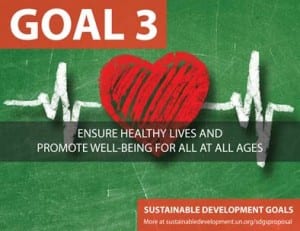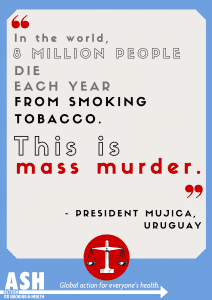 Tobacco and the Sustainable Development Goals (SDGs)
Tobacco and the Sustainable Development Goals (SDGs)
The inclusion of tobacco control in the Sustainable Development Goals has been in the works for several years. It is due to various advocacy efforts of the Framework Convention Alliance and the support of NGO partners and allied missions in New York and at country level. In the early stages of the post-2015 process, support for tobacco control and the FCTC was limited. However, as time went on various synergies formed between member states, other NGOs, and the tobacco control community to achieve this goal.
FCA worked to represent the tobacco control community within the various UN entities in New York. They worked with the NGO major to include tobacco control in their recommendations for the 10th Open Working Group negotiations. There were several champions of tobacco control during the OWG negotiations, including Palau, who relentlessly emphasized the importance of the FCTC as an integral part of sustainable development. In addition, Uruguay strongly supported the inclusion of the FCTC at the World Health Assembly in 2014. Several other countries showed their unwavering support including: Jamaica, Belgium, Australia, Peru, and Costa Rica.
During the civil society hearing for the OWG negotiations, FCA had the opportunity to speak about the importance of the FCTC in the SDGs. The global tobacco control community was determined to promote the FCTC in the SDGs and to be involved in the process as well. This dedication was demonstrated by their participation in various online consultations. The FCA stressed the importance of tobacco control and the FCTC at a side event for civil society and member states, as well as on a panel at the CSW58.
The FCTC was first included in the zero draft for OWG 12 as a target under goal 17 for means of implementation. This target was at risk for being removed by a few countries who felt as though the FCTC was too specific to include. After several countries showed support for the need for the FCTC, it was maintained in the final draft of the OWG proposal. It was also moved to goal 3 (3a), as a means of implementation target under the health goal.
After several years of hard work and advocacy efforts in New York and at country level, the FCTC has been included in the Sustainable Development Goals. This seemed like a far-fetched goal at the beginning of this journey. Fortunately, the goal was attained due to collaboration, persistence, and hard work. Countries must now implement the FCTC in order to achieve comprehensive tobacco control at the national level to reduce morbidity and mortality due to tobacco use.
 Trade
Trade
Trade and tobacco issues featured prominently at this year World Conference on Tobacco or Health (WCTOH), including a full half-day pre-conference workshop, a tri-plenary and a symposium co-sponsored by ASH. In addition, the risk of trade lawsuits came up in nearly every substantive policy discussion. This is in stark contrast to the 2012 WCTOH in Singapore, at which ASH pushed hard to have a single panel devoted to trade. ASH also worked with allies to achieve the adoption of a strong declaration on trade:
“Going forward governments treat tobacco uniquely in all trade and investment and support one another in excluding tobacco from trade and investment agreements that are under negotiation.”
ASH was also able to advance discussions with European allies over the negotiation of the Trans-Atlantic Trade and Investment Partnership (TTIP), and will be attending a meeting in Edinburgh in June to formulate strategy.
 Criminal Liability
Criminal Liability
ASH recently attended the World Conference on Tobacco or Health (WCTOH) where we presented the criminal liability program on two different panels, one organized by ASH, and one that we were invited to join by the Human Rights and Tobacco Control Network. WCTOH has been held every three years since 1967, and is the preeminent gathering of researchers, advocates and government officials on the global tobacco epidemic.
We also hosted a side event, attended by tobacco control experts at the conference to discuss suggestions, concerns and assistance moving forward with the criminal liability program. 8 countries were represented at the side event, as well as several attorneys with long experience litigating against the tobacco industry.
In the closing plenary, in front of over 2,000 attendees from 100 countries, Professor Harry Lando, the chair of the scientific program committee, mentioned criminal liability as a potential path forward. This is a significant step for the program; we passed the “straight face” test and the tobacco control community views criminal liability as a viable option in the tobacco endgame.